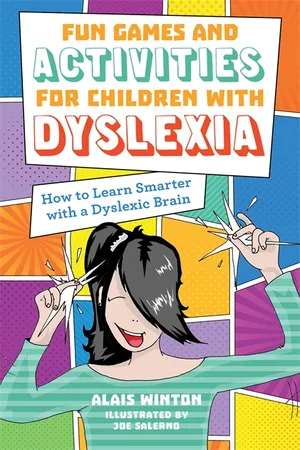![]()
CHAPTER 1
A Very Special
Letter
My name is Alais (pronounced ‘Alice’) and I am dyslexic.
Being dyslexic can mean different things to different people, but it usually means that spelling and reading can be difficult.
The good thing about being dyslexic is that it can mean that you are very creative and can think in pictures instead of words.
Some time ago I was sent a very special letter. It was written by Hannah, who was ten when she wrote the letter.
I had spoken to Hannah’s mum on the phone and she told me that Hannah was finding spelling tests and reading in school hard.
Hannah wanted to write me a letter to tell me what being dyslexic was like for her. This is what she wrote:
Dear Alais Winton,
I find Dyslexia as a good thing but then also a bad thing.
One good thing is I get a lot of support in my class.
My mum says that people who are dyslexic succeed and I believe her.
My teacher tries to teach me but in writing and reading I sometimes don’t get it.
One bad thing is in class I feel like I’m not as good as other people.
Some teachers just make me do easy work.
Sometimes I have to move away from my friends, which makes me feel sad as I have no support from the other children on that table.
I love Drama and Art and History.
In school I find spelling hard and usually get four out of fifteen, maybe ten out of fifteen, which is not a lot according to my teacher.
Hopefully you can help me as I feel left out, and not as good as other people.
I was really moved by Hannah’s letter. She did make some spelling mistakes (which I have corrected), but I was able to understand everything she was saying in this letter.
When I was in school I remember feeling the same as Hannah: sometimes I just didn’t get it and I couldn’t understand why.
I didn’t find out that I was dyslexic until I was eighteen and, when I did, I wasn’t sure at first what it meant.
I think Hannah was really brave and honest in her letter, and it made me very sad to hear that she didn’t feel as good as other people.
I have been a teacher for a long time (and a learner, too) and I really believe that learning should be fun and make you feel good about yourself by finding out what you are good at.
I did some work with Hannah. When I met her I realised that, even though she found spelling and reading harder than people who were not dyslexic, she was very bright.
She thinks about things very deeply, and has at times asked me questions that adults may not have thought of.
People think in different ways because we don’t all have the same kind of brain.
This means that people also learn in different ways.
Most subjects in school (apart from Art and Drama) have a teacher standing at the front of the class explaining what is on the board, and the children write notes.
For many people, especially those who are dyslexic, this method does not work very well.
If your English and Maths lessons are not often like this, you probably have a super smart teacher who might also be a bit of a rebel – lucky you!
But if sitting and writing notes sounds like the classes at your school, and it doesn’t work well for you, take the following quiz to find out what is your best learning style.
You may get a high score in more than one area; this will just mean that you can ‘mix and match’ and choose which method you want to use.
Learning styles statements: Is it true for you?
Read these statements and decide whether they are true for you, answering ‘yes’, ‘maybe’ or ‘no’. Score one point for ‘yes’, half a point for ‘maybe’ and zero points for ‘no’. Add up the totals for each style and see which method works best for you.
Visual-Spatial (picture thinker) – best games and activities found in Chapters 2 and 3
O You think in images or pictures and not in words.
O You often find yourself doodling when you are making notes.
O You find it easier to understand something if there is a diagram, picture or video.
O You prefer games which use visual skills, for example ‘Pictionary’, ‘pairs’ or a games console.
O You can imagine how things would look from different points of view.
Physical (movement thinker) – best games and activities found in Chapters 2 and 4
O You prefer PE and practical lessons.
O You like to think about things whilst doing something physical, such as walking or running.
O You find it difficult to sit still in class and other people have described you as a ‘fidget’.
O You take part in a sport or exercise outside of school time.
O If you are learning something new, you prefer to do this in an active ‘hands on’ way, rather than read a book or follow written or verbal instructions.
Musical (music thinker) – best games and activities found in Chapter 5
O You listen to music on your MP3 player or phone whenever you can.
O You wouldn’t want to think about a world without music.
O You play an instrument or sing.
O You often find yourself thinking of music from...

